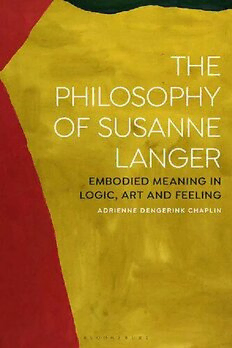
The Philosophy of Susanne Langer: Embodied Meaning in Logic, Art and Feeling PDF
399 Pages·2020·5.532 MB·English
Most books are stored in the elastic cloud where traffic is expensive. For this reason, we have a limit on daily download.
Preview The Philosophy of Susanne Langer: Embodied Meaning in Logic, Art and Feeling
Description:
This book is a comprehensive study of one of the most insightful and fertile but also one of the most neglected and misunderstood philosophers of art of the twentieth century, Susanne Langer.By the late 1980’s Langer’s Philosophy in a New Key (1942) was Harvard University Press’s all-time best-seller. But failure to recognise Langer’s seminal philosophical sources has led to frequent misinterpretations and misunderstandings. Beginning with an overview of Langer’s life and education, this study provides a much-needed explanation of how Langer’s philosophy of mind and feeling was shaped by four seminal sources: her mentors Henry Sheffer and Alfred North Whitehead and the European philosophers Ernst Cassirer and Ludwig Wittgenstein. By acknowledging the role of Sheffer and Whitehead, Chaplin is able to explain Langer’s aesthetics against the background of her earlier work on symbolic logic and argue that aesthetics for Langer does not lie at the margins of philosophy but at its very centre.Shedding new light on Langer as an American philosopher whose innovative thought crosses the customary boundaries between analytic and European philosophy, The Philosophy of Susanne Langer confirms why she continues to have relevance today.
See more
The list of books you might like
Most books are stored in the elastic cloud where traffic is expensive. For this reason, we have a limit on daily download.
